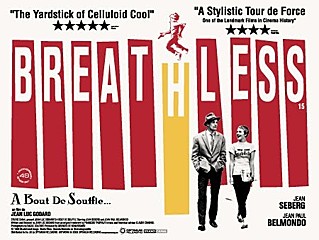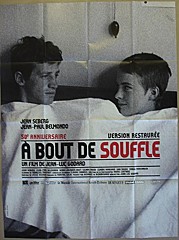Breathless (À Bout de Souffle) (1960)
“Every time I succumb anew to this film’s fresh sexiness, playful style and icy cool, I think it must surely have been made yesterday. The new digital restoration only enhances that impression and there isn’t much left to be said except: joyeux cinquantième anniversaire.”
- Jason Solomons in The Guardian 2010
Once again I see this film. Why? Each time I see it I understand better its appeal and my frustrations.
This is a seminal work; one that must have sent ripples through anyone who saw its first release and wanted the world to be a different; and above all wanted cinema to be different. À Bout de Souffle takes the mythic magic of Bogart and Bacall and relocates it for a new age in a new film grammar. It confers power to make meaning to an audience that had rarely enjoyed such power. In short, it treated film as art.
It also took the industrial filmmaking means out of the studio and onto the street: 16mm, available light, no location sound, no shooting permits, no traffic control: just get out and shoot. In fact, there’s not much of a pre-written script. Story changes are abrupt, dialogue meanders, cuts, for the first time, jump. This is what freedom looks and feels like: sexual, moral, financial, cinematic freedom. Exciting.
“The film of tomorrow will not be directed by civil servants of the camera, but by artists for whom shooting a film constitutes a wonderful and thrilling adventure.”
- Francois Truffaut in Arts, 1957.
But who exactly is thrilled? The barely-considered script does not really empower its audience quite as much as it ignores that audience; the dialogue is at times interminable; and the hatchet techniques grate rather than illuminate. Acting under these conditions is tested beyond usefulness to the point that emotional turning points are missed; not in a way that feels deliberate, pointed or ironic; but rather as though no-one understands what’s going on. Consider the moment Patricia tells Michel she’s ratted on him to the police. Are we afforded a distant Brechtian perspective on this pivotal moment or do we feel simply that something has been left unacknowledged? Are we in the throes of the kicking dream or following the insights of a polemic essay? It would seem neither is the case given such inconsequential events. Life may not be like Hollywood movies, but it’s not like this either, and so the effect is both unemotional and apolitical. Is this not bourgeois art-for-art’s-sake?
Indeed, in this same scene we are beaten over the head with the fact that they’re shooting handheld, as the camera follows each character around from living room to hall and back again. Richard Lester are you taking notes?
It’s very self-consciously cool, but it is also cold. The sexiness – and they are a very good looking, nicely-styled, freewheelin’ couple – is undermined by the lack of narrative substance; drowned in undisciplined techniques; and overwhelmed by authorial intrusion: ‘le camera stylo’; the camera as pen.
“The style is everything, a calculated destruction and remaking of traditional film grammar, and Godard formulated his much-quoted idea that ‘a film should have a beginning, a middle and an end, but not necessarily in that order’.”
- Philip French, The Guardian
But does it feel like a film? Well, it documents its world, which puts us in a privileged cinematic position – all cinema is voyeurism after all – and you feel like you could have gone to Paris and just stepped into that world, which must have been an amazing feeling back in 1960, but 50 years later, its overly loose narrative, and its collagist’s approach to an argument make it a bit of a chore to watch.
Film is not photo-montage, neither is it a journal: it’s too full of life for the mere collision of images or ideas. Time passes, and we can all feel that time passing. For this reason, film, whether dreamlike or distant, needs an emotional heartbeat that is something close to music; and dynamic music at that. Miss those evolving pulses and beats, and we may miss your point.
À Bout de Souffle is a seminal work, no doubt; this film marks a change, and doubtlessly changed filmmaking everywhere – it’s hard to imagine the likes of Easy Rider being made ten years and ten thousand kilometres away without it – but this is the new cinema in its infancy: showy and brash and needing to go up to its room until it’s ready to behave.
It should be said that À Bout de Souffle is far from alone in achieving extraordinary acclaim through showing off the sexy-cool of its faces whilst disregarding its audience’s desire for a coherent script: Bogart and Bacall had done just that for Howard Hawks in The Big Sleep only 14 years earlier. But that’s another story.
I wasn’t there when À Bout de Souffle first opened. I wish I had been. I first saw it in the Edinburgh Filmhouse as a schoolboy (was thrilled) and last saw it in the GFT three weeks ago. I’ve seen it on TV since then, and I even have the DVD. If you haven’t seen this film, I recommend that you do (along with many other Godard films). Give your heart to it, but don’t forget your head or be afraid to admit you don’t like it as much as you feel you ought to.
Above all, if you’re about to make a film, please be very careful what you take from Godard.
The restored version of À Bout de Souffle gets its DVD release on 13 September.
Superb trailer for À Bout de Souffle:
http://www.youtube.com/watch?v=w2hDR_e1o1M
Cinematographer Raoul Coutard reflects on shooting À Bout de Souffle:
http://www.guardian.co.uk/film/2010/jun/06/raoul-coutard-jean-luc-godard-breathless
For a highly-informed, in-depth appraisal of À Bout de Souffle as well as Godard through the years, read Philip French (he was there):
Jason Solomons:
http://www.guardian.co.uk/film/2010/jun/27/a-bout-de-souffle-godard
















Comments